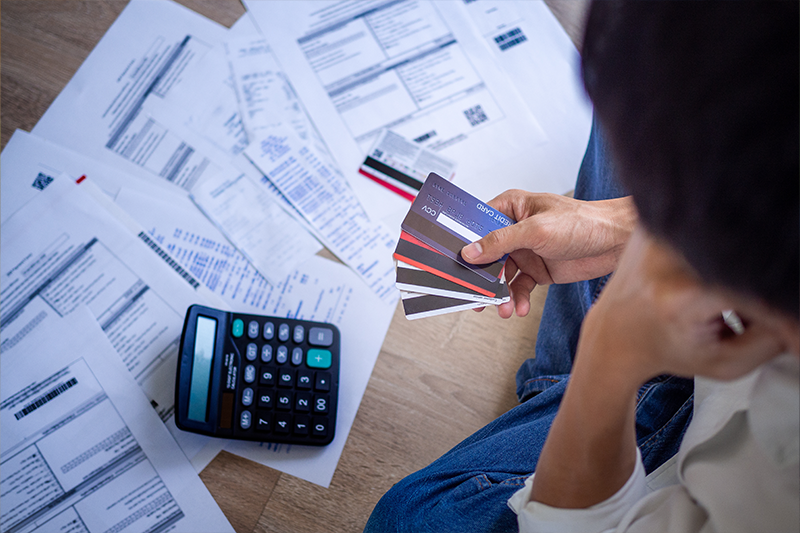What Happens When You Stop Paying Credit Cards

Falling behind on your credit card payments can feel scary and overwhelming, and you might not understand the full consequences until it’s too late. And while you can legally choose to stop paying your credit cards, that choice can lead to a long list of financial and legal challenges – from late fees and penalty interest rates to lawsuits, wage garnishments and years of damaged credit.
Knowing your options is the first step toward recovery. Let's take a closer look at the repercussions of stopping your credit card payments – plus some guidance on how to navigate debt and start your journey toward financial recovery.
Consequences of Missed Payments: Immediate Impact on Credit Scores
When you miss a credit card payment, your troubles could begin almost immediately. While many credit card companies offer a grace period of a few days, after 30 days, your credit card issuer can report your late payment to the three major credit bureaus: Experian, TransUnion and Equifax. This action will cause your credit score to drop – often by 50 to 100 points with just one missed payment.
The damage can be even worse if you already have some dings on your credit history. That’s because payment history is the most heavily weighted factor in your credit score. A late mark can stay on your credit report for up to seven years.
Late Fees and Penalties: Accumulating Costs for Missed Payments
Even before your credit takes a hit, you’ll face late fees if you don’t make a credit card payment. Most card issuers charge between $30 and $41 for a late payment fee, and they can tack on additional penalty fees for subsequent violations. These fees can quickly turn a manageable credit card balance into a mountain of credit card debt.
Late fees are charged every billing cycle that your payment remains overdue – so missing just a couple of minimum payments can make it even harder to get back on track.

Interest Rate Increases: How Missed Payments Lead to Higher Rates
Failing to make credit card payments can also trigger a penalty APR, which is a much higher interest rate –often around 29.99%. Once activated, this rate can apply not only to new purchases but also to existing balances.
Even if you’ve been enjoying a low promotional interest rate, missing payments can void those terms. The result? Your credit card bill balloons because of rising interest charges, even if you’re not using your card.
Collection Calls and Notifications: Dealing with Creditors and Collection Agencies
If you stop paying your credit card, you can expect phone calls, texts, emails and letters from your credit card issuer or a collection agency. And once your debt is sold to a third-party debt collector, this outreach usually intensifies. The FDCPA applies to third-party debt collectors (not original creditors) and restricts harassment, false statements, and inconvenient contact times. You can send a written request to limit or stop collector communications as permitted by law. Rules under CFPB Reg F also apply to collector communications.
Under the Fair Debt Collection Practices Act, debt collectors have to follow certain rules – but that doesn’t mean the calls will stop.
Negative Impact on Credit Report: Reporting Delinquencies to Credit Bureaus
A missed payment isn’t reported to the major credit bureaus until it’s at least 30 days late – and the longer it remains unpaid, the worse it looks on your credit report. Delinquencies are reported in 30-day increments (30, 60, 90, etc.), and each interval further degrades your credit score.
Eventually, lenders will see a pattern of risky financial behavior. This may impact not only your current credit card accounts, but also your ability to open new lines of credit, get a car loan, or, in some cases, even rent an apartment.
Delinquencies are typically reported in 30-day increments (30/60/90+). Paying a past-due amount updates status but does not remove accurate late payment history. The FCRA generally allows reporting of most delinquencies for up to seven years from the original delinquency date that led to charge-off.
Risk of Legal Action: Potential Consequences and Legal Proceedings
When a balance hits around 90 days past due, some creditors may escalate to legal action. For example, you may be served with a summons and sued for the unpaid balance. If you don’t respond, a default judgment is likely, and the court may allow wage garnishment, bank account levies or property liens in order to help the lender recover the unpaid balance.
In many states, a court judgment can last for 10-20 years and may be renewed. During this time, interest continues to accrue, and you could ultimately pay more than double what you originally owed.
Asset Seizures and Liens: The Risk of Losing Assets in Extreme Cases
Although credit card debt is unsecured – meaning it’s not backed by collateral – a court judgment allows creditors to attach liens to your property, garnish your wages, or potentially seize your bank accounts. This is more common in states that don’t offer strong consumer protections.
Credit Card Account Closure: Closure and Restriction of Card Access
Eventually, the credit card company will close your credit card account. This typically happens after at least 180 days of nonpayment, when the issuer charges off the account.
This kind of account closure reduces your total available credit, which may also impact your credit utilization ratio, another major factor in your credit score. Losing access to that account means you can no longer use your card – even if you catch up on payments in the future.
Negotiating With Creditors: Options for Debt Settlement and Negotiation
If you’re facing a financial hardship, you have options other than skipping your credit card payments. Don’t wait until your account is in collections. Contact your credit card issuer as soon as you realize you may miss a payment. Many companies offer hardship programs that can lower your minimum payment, reduce your interest rates or temporarily waive fees.
It’s important to be honest about your financial situation. Some creditors may even allow a six-month forbearance or a payment plan if you show good faith.
Debt Collection Process: How Unpaid Debts Move Through the Collection Process
Once your debt is charged off, the credit card company typically sells it to a third-party debt collector. That collector may try to contact you or even resell the debt again. Each transfer of your debt can restart the collection clock – meaning ongoing stress and confusion for you.
Keep in mind that debts can remain collectible for years, depending on your state’s statute of limitations – often between three and six years.
Charge-Offs and Credit Score Impact: Declaring the Debt as Unrecoverable
A charge-off is an internal accounting procedure that happens after 180 days of nonpayment. It marks the debt as a loss on the credit card issuer’s books, but it doesn’t wipe out your unpaid bill.
Instead, the charge-off status shows up on your credit reports and can have a devastating effect on your overall credit score. It’s one of the most negative marks you can have on your report – and like delinquencies, it stays on your record for up to seven years.
Options for Financial Hardship: Seeking Assistance and Exploring Hardship Programs
If you’re struggling to make minimum payments, start by revising your budget. Identify nonessential expenses you can cut and consider temporary income sources like gig work to generate enough money to pay your credit card bills.
If your credit is already impacted and you’re looking for a way to recover, consider responsible use of a card like the Juzt Card[1], which doesn’t require perfect credit to apply. Juzt offers pre-approval with a soft credit check, helping you avoid unnecessary credit score dings while exploring your options.
In addition, many credit card holders qualify for hardship programs that reduce interest rates or allow them to defer payments – so don’t hesitate to ask for help.
If making your minimum payments is difficult, you’re not alone. In fact, according to a recent analysis from MSN Money, Americans are carrying larger credit card balances than in previous years, and many consumers struggle to make even the minimum payments on time.

Bankruptcy Considerations: Last Resort Options and Implications
Bankruptcy can help give you a fresh start, but it does come with serious consequences. Consider the following:
Chapter 7 bankruptcy discharges most unsecured debts, including credit card debt, but stays on your credit report for 10 years.
Chapter 13 bankruptcy allows you to repay your debts over three to five years, and it stays on your record for seven years.
Both bankruptcy options immediately stop all collection efforts, including lawsuits, wage garnishments and foreclosures.
Rebuilding Credit After Default: Strategies for Recovering Creditworthiness
Rebuilding your credit takes time, but it's absolutely possible. Start by catching up on any current accounts and making on-time credit card payments going forward. You also might consider using a secured card or credit-builder loan to help rebuilt your payment history.
You might also consider an option like the Juzt Card – an unsecured credit card that doesn’t require a deposit but still reports to Equifax each month. The Juzt Card is designed specifically for people with limited or damaged credit and offers instant access via Apple Pay or Google Pay, helping you build credit over time. A product like the Juzt Card can be a great starting point for rebuilding your financial foundation.
Financial Counseling and Debt Management: Seeking Professional Guidance for Debt Resolution
If you’re feeling overwhelmed, you may consider reaching out to a nonprofit credit counseling agency. Some nonprofit agencies assign a trained education manager or counselor who can help you develop a personalized debt management plan. They may be able to help you design a workable budget and potentially enroll in a nonprofit debt management program that consolidates your payments.
The decision to stop paying credit cards is never easy, and the fallout can be long-lasting. But no matter how deep in debt you are, there are always steps you can take – whether that’s negotiating with creditors, working with a nonprofit credit counselor, or exploring legal options like bankruptcy. Acting early and honestly is the best way to protect your future and begin repairing your personal finance health.
This article is for informational purposes only and does not constitute legal, tax, or financial advice. Laws and creditor practices vary by state and issuer. Consider consulting a qualified attorney, tax professional, or accredited nonprofit credit counselor for guidance about your situation.
Credit reporting timeframes and statutes of limitations are different concepts. The credit reporting period is generally governed by the Fair Credit Reporting Act (FCRA), while the statute of limitations on lawsuits is set by state law.
[1] Juzt Credit Card is issued by tbom®, Perryville, MO. Standard credit approval required. Terms, rates (APRs), and fees are subject to change. See the Juzt Credit Card Terms and Conditions for complete information, including APRs, fees, and repayment obligations. Approval is not guaranteed.
Frequently asked questions
Table of contents
-
Consequences of Missed Payments: Immediate Impact on Credit Scores
-
Late Fees and Penalties: Accumulating Costs for Missed Payments
-
Interest Rate Increases: How Missed Payments Lead to Higher Rates
-
Collection Calls and Notifications: Dealing with Creditors and Collection Agencies
-
Negative Impact on Credit Report: Reporting Delinquencies to Credit Bureaus
-
Risk of Legal Action: Potential Consequences and Legal Proceedings
-
Asset Seizures and Liens: The Risk of Losing Assets in Extreme Cases
-
Credit Card Account Closure: Closure and Restriction of Card Access
-
Negotiating With Creditors: Options for Debt Settlement and Negotiation
-
Debt Collection Process: How Unpaid Debts Move Through the Collection Process
-
Charge-Offs and Credit Score Impact: Declaring the Debt as Unrecoverable
-
Options for Financial Hardship: Seeking Assistance and Exploring Hardship Programs
-
Bankruptcy Considerations: Last Resort Options and Implications
-
Rebuilding Credit After Default: Strategies for Recovering Creditworthiness
-
Financial Counseling and Debt Management: Seeking Professional Guidance for Debt Resolution